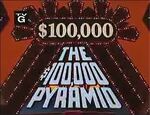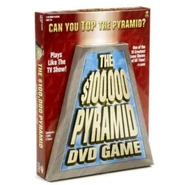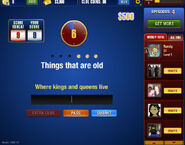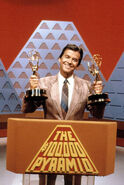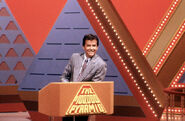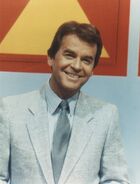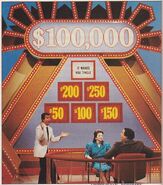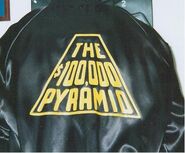| Aired | |
| Syndicated, September 9, 1985 - September 2, 1988 | |
| Number of episodes | |
| 550 | |
| Run time | |
| 30 Minutes | |
| Host | |
| Dick Clark | |
| Announcers | |
| Jack Clark Johnny Gilbert Bob Hilton Charlie O'Donnell Charlie Tuna Dean Goss | |
| Origination | |
| CBS Television City Hollywood, California | |
This is chronicling the original 1980s era of The $100,000 Pyramid.
Game Format[]
Main Game[]
Two teams, each consisting of a celebrity guest and a studio contestant, attempted to guess a series of items relating to different categories within a short time limit based on clues given by their partners.
The game consists of six categories, each one cleverly written in order to give team members a vague idea of what it was about (ex: "Loosen Up" - things that are stiff; "Made Public" - things that are used by the public; "The Woodsman" - things that a carpenter uses). Some categories also involved famous people, which contestants and celebrities both dreaded. Each team played each category in alternating order (their choice), and for each category, one person on the team had 30 seconds to describe seven items relating to that category to their partner. Teams scored 1 point for each correct answer (for a maximum of 7 points); if they passed on a word, they could not come back to it, but if the receiver guessed it right after it was passed, the team still earned a point for it. The clue giver could use voice inflections and hand/body movements while describing a word, but they could not say the actual word or any other part of it or else they would lose out on that potential point score (accompanied by a "cuckoo" sound effect). For the first two categories, the celebrities gave the clues, then the contestants gave the clues for the next two, and then for the final two, teams decided amongst themselves who would give or receive clues (the team that was trailing usually got first pick between the last two categories). The team in the lead after the sixth category moved on to the Winner's Circle.
Bonus Cards[]
In each half of the show, there was a bonus card hidden behind one of the six categories on a board and for the team that uncovered it, the contestant partner had a chance to win either bonus money or a bonus prize which would be theirs to keep whether they won the game or not. Of course, to win the bonus, the team had to get all 7 answers right. In situations where a team didn't all 7 points to win on the very last category or they won the game automatically, if the very last category concealed the bonus card, the team was allowed to play the category all the way out to try and win the bonus prize.
- 7-11 - Played in the first game; if the team that selected the category with this bonus card got all 7 answers right within 30 seconds, the contestant partner won an $1,100 bonus.
- Mystery 7 - Featured in the second game, the Mystery 7 was named as such because the team that played it was not told what the category was about until it was done and over with.
Tiebreaker[]
If both teams were tied after the sixth category, then a tiebreaker was played to determine the winner. One member of each team had to describe seven items beginning with the same letter of the alphabet to their partner in as fast a time as possible; the team that score the most out of 7 broke the tie and won. The team that caused the tie got first pick between two sets of words that each began with a different letter of the alphabet; however long it took them to complete their letter set would be the time that the opposing team had to complete theirs in order to break the tie and win. In the case of a perfect 21-21 tie, the contestant partner of the tiebreaking team won $5,000, theirs to keep whether they won the game or not.
Winner's Circle[]
The Winner's Circle was still played the same way as before: one member of the winning team had 60 seconds to describe six categories of increasing difficulty to their partner by listing items relating to each category. Contestants always had the option of whether they wanted to give or receive clues in the Winner's Circle, but celebrities usually gave the majority of the time. Regardless of who gave the clues, there were strict rules involving the types of clues players could not give in the Winner's Circle (see below):
- Clue givers could not use their hands (their chair had special straps attached to the arms to prevent them from doing so)
- Clue givers could not give away any part of the category itself or the essence thereof
- Clue givers had to use a short and concise list of clues; they could not use clues that were overly descriptive
- Clue givers could not use synonyms or prepositional phrases
- Clue givers' clues had to relate to the category itself
If the clue giver gave an illegal clue at any time, the category in play was thrown out, thus disqualifying the contestant from winning the grand prize. However, if this happened with time left on the clock and with unrevealed categories yet to be played, then the team was allowed to play the remainder of the Winner's Circle until time ran out or until the remaining categories were all correctly guessed. The first category was worth $50, and each subsequent category was worth $50 more, up to $300 for the sixth. If the team got all six right before the time expired, then the contestant partner won the grand prize.
Whichever contestant made it to the Winner's Circle in the first half of the show played for $10,000; if they won then made it back to the Winner's Circle in the second half, then they played it for $15,000 more. If they won less then $10,000 in the first Winner's Circle, but won the second, their winnings from the first Winner's Circle were augmented to $25,000. If both contestants made it to the Winner's Circle in each half of the show, then they each played it for $10,000.
Only the money scored in the Winner's Circle determined who won the game (bonus money from the 7-11 and 21-21 tiebreakers did not count). If a contestant made it to the Winner's Circle twice in one show, then he/she automatically returned the next night to compete again. If both contestants made it to the Winner's Circle in each half of the show, then the one who won the most money there returned. If both contestants tied each other in that same scenario, including $10,000 wins, then they both got to return on the next night to play against each other again.
Contestants were allowed to remain on the show until they were defeated or until they won five nights in a row.
$100,000 Tournament[]
The three contestants who made it to the top of the pyramid in the shortest lengths of time during a seven to ten-week span were invited back at a later date to compete in the show's $100,000 tournament. The tournament was played round-robin style, with two contestants competing each episode while the third sat out (the two contestants with the fastest qualifying times played against each other the first night of the tournament). During the tournament, all front game bonuses were eliminated save for the $5,000 bonus for winning a 21–21 tiebreaker. The first contestant to make it to the top of the pyramid within the usual 60 seconds won $100,000 and ended the tournament, since only one person could win it. If neither contestant won, then the one who scored the most money in the Winner's Circle returned on the next episode to compete against the contestant who had sat out on the current episode (in the event of a tie, a coin toss determined who returned on the next episode). If somebody won the $100,000 in the first half of a tournament episode, then the other two contestants played against each other in the second half of the show and the winner of that game played the Winner's Circle for $10,000.
During the three years that The $100,000 Pyramid was on the air, the show held twelve $100,000 tournaments. These were the twelve contestants who won the $100,000, along with the celebrities who helped them win it (in order):
| Tournament # | Tournament Winner | Celebrity Partner | OAD (Original Airdate) | Total Winnings |
|---|---|---|---|---|
| 1 | Richard Mahaffey | Shelley Smith | November 22, 1985 (1st round) | $119,450 |
| 2 | Andy Culpepper | Brian Stokes Mitchell | February 6, 1986 (2nd round) | $113,250 |
| 3 | Patty Geiger | Mary Cadorette | May 9, 1986 (2nd round) | $122,800 |
| 4 | Cheryl Reinwand | Audrey Landers | September 18, 1986 (2nd round) | $150,800 |
| 5 | Denise Bumblis | Shelley Smith | November 6, 1986 (2nd round) | $118,600 |
| 6 | Mary Monte | Lauri Hendler | January 26, 1987 (1st round) | $123,600 |
| 7 | Marilyn Evans | Linda Kelsey | May 5, 1987 (2nd round) | $147,600 |
| 8 | M.G. McCormick | Barry Jenner | September 11, 1987 (2nd round) | $133,650 |
| 9 | Debbie Sepian | Markie Post | November 5, 1987 (2nd round) | $129,400 |
| 10 | Keefe Ferrandini | Nathan Cook | January 19, 1988 (1st round) | $122,450 |
| 11 | Tracey Trench | David Garrison | March 29, 1988 (1st round) | $121,100 |
| 12 | Carrie Etheridge | Teresa Ganzel | August 31, 1988 (2nd round) | $119,100 |
Trivia[]
- Shelley Smith held the distinction of being the only celebrity to help win two separate tournaments on this version (see chart above).
- Although he never won a tournament, Henry Polic II played more tournament weeks than any other celebrity (both weeks in the first tournament, the third week of the seventh tournament and the twelfth and final tournament). He also is the only celebrity to play back to back weeks.
- Before becoming a contestant on The $100,000 Pyramid, Richard Mahaffey (the first tournament winner) was a contestant on Press Your Luck in February 1984 (under the last name Devon), where he won a total of $4,050 ($2,000 in cash and a $2,050 trip to the Bahamas). His wife Lani competed on The $25,000 Pyramid in December 1982.
- Tim Butler, one of the contenders from the third tournament, was previously a contestant on Wheel of Fortune in 1983 and Press Your Luck in November 1984 (he lost on both shows). He later became a production staff member for the show.
- Keefe Ferrandini was the only contestant to win the tournament in the clue giver's chair.
- Mary Monte was the only black contestant to win a tournament.
- The seventh tournament was the show's longest tournament (three weeks). The tenth tournament, however, was the show's shortest (two days).
- Barry Jenner nearly tied Billy Crystal's record time of 26 seconds when he took M.G. McCormick to the top of the pyramid for the $100,000 (27 seconds).
- This version awarded the biggest total in Pyramid history, $150,800 to Cheryl Reinwand.
- Marc Cherry, who went on to produce/write for The Golden Girls, and also create Desperate Housewives in 2004, was a contestant on the August 11-12, 1986 episodes. He won $10,000 with Ken Kercheval.
- The biggest non-tournament winner was Kathy Rechtsteiner, who won $66,450 in April 1987, being partnered with Meg Bennett, Don Galloway, Martha Smith, and Dick Cavett. Her earnings included two $25,000 wins, one $10,000 win, five 7-11 $1,100 bonuses, and four Mystery 7 prizes. She never made it to the tournament.
Stations []
Stations that aired The $100,000 Pyramid included:
New York - WOR (now WWOR)
Los Angeles - KHJ (now KCAL)
San Diego - XETV
Boston - WNEV (now WHDH)
Kansas City - KCTV
Detroit - WXON
St. Louis - KPLR
Tampa - WTSP
Indianapolis - WTHR
Birmingham - WBMG (now WIAT)
Albany, NY - WTEN
Knoxville - WTVK (now WVLT)
Waco - KCEN
Bakersfield - KGET
La Crosse - WXOW
Chicago - WFLD (1985-87), WPWR (1987-88)
Milwaukee - WISN/WTMJ
Twin Cities - KARE (then WUSA)
San Francisco - KPIX
Atlanta - WXIA (1985-86); WVEU (1986-87, now WUPA); WSB (Fall/Winter 1987); WAGA (Winter/Spring/Summer 1988)
Denver - KUSA
Phoenix - KTSP (now KSAZ)
Indianapolis - WRTV
Pittsburgh - WTAE (9/2/85-early 1986) & WPXI (early 1987-9/2/88)
Portland, OR - KATU
Tucson - KTTU (then KDTU)
Miami - WTVJ
West Palm Beach - WTVX
Green Bay - WFRV
Burlington, IA - KMJH (now KGCW-TV)
Grand Rapids - WWMT
Lansing - WLNS
Flint - WJRT
Philadelphia - WCAU (10/14/1985-3/7/1986 and 3/23/1987-9/4/1987)/KYW (9/14/1987-9/2/1988)
Houston - KTXH
Charleston, SC - WCIV
Marquette, MI - WJMN
Rockford - WQRF
Amarillo - KFDA
Dothan, AL - WDHN
Seattle - KSTW
Cincinnati - WCPO
Dallas - KDFI
Las Vegas - KTNV
Rochester, NY - WROC
New Orleans - WVUE
Charlotte - WSOC (1986-87), WPCQ (1987-88; now WCNC)
Greenville, SC - WAXA (Jan.-Sept. 1988; now WMYA)
Merchandise[]
Computer Games[]
Box Office (1987)[]
It was released for the Commodore 64, DOS and Apple II computers at the time.
Sierra (2001)[]
Banner[]
It was released for the PC at the time.
Video Slot Machine[]
IGT/International Game Technologies (2004)[]
Featuring the late Dick Clark.
Brochure[]
Video[]
Interactive Online Games[]
Game Show Network/GSN[]
WebTV Version[]
Online version[]
DVD Game[]
MGA Entertainment (2006)[]
Facebook Game[]
Iwin (2011)[]
Lottery Ticket[]
Photos[]
Trade Ads[]
Print Ads[]
Article[]
Set Pics[]
Staff Member Jacket[]
Tickets[]
Slate[]
Episode Status[]
The entire run exists, and was rerun on GSN.
See Also: The New $25,000/$100,000 Pyramid/Episode Guide
Video[]
See Also[]
The $10,000 Pyramid
The $20,000 Pyramid
The $25,000 Pyramid
The $25,000 Pyramid (1982)
The $25,000 Pyramid (2010)
The $50,000 Pyramid
The $100,000 Pyramid (1991)
The $100,000 Pyramid (2000)
The $100,000 Pyramid (2016)
The $500,000 Pyramid
The $1,000,000 Pyramid (2000)
The $1,000,000 Pyramid (2009)
Pyramid (1996)
Pyramid (1997)
Pyramid (2002)
The Pyramid (2012)
Pyramid Rocks
The Junior Pyramid
Junior Partner Pyramid
All-Star Junior Pyramid
Links[]
The $100,000 Pyramid program description at Game Show Network
The $100,000 Pyramid CD-ROM Game by Sierra (2001)
The $100,000 Pyramid Video Slots by IGT (2004)
The $100,000 Pyramid DVD Game
The $100,000 Pyramid Tribute Page on Facebook

